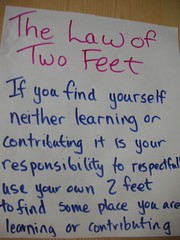
This is going to be long and not my usual style of conference notetaking. Because this was an unconference, there really wasn’t much in the way of prepared presentations, except for the lightening talks in the morning. What follows below the jump is what I captured from the conversations, often simply questions posed that were left open for anyone to answer, or at least consider.
Some of the good aspects of the unconference style was the free-form nature of the discussions. We generally stayed on topic, but even when we didn’t, it was about a relevant or important thing that lead to the tangents, so there were still plenty of things to take away. However, this format also requires someone present who is prepared to seed the conversation if it lulls or dies and no one steps in to start a new topic.
Also, if a session is designed to be a conversation around a topic, it will fall flat if it becomes all about one person or the quirks of their own institution. I had to work pretty hard on that one during the session I led, particularly when it seemed that the problem I was hoping to discuss wasn’t an issue for several of the folks present because of how they handle the workflow.
Some of the best conversations I had were during the gathering/breakfast time as well as lunch, lending even more to the unconference ethos of learning from each other as peers.
Anyway, here are my notes.
Continue reading “#ERcamp13 at George Washington University”
